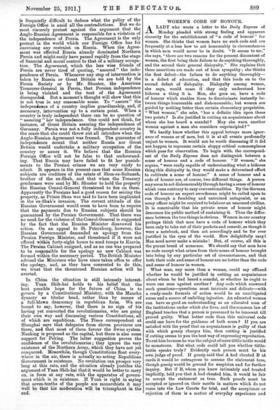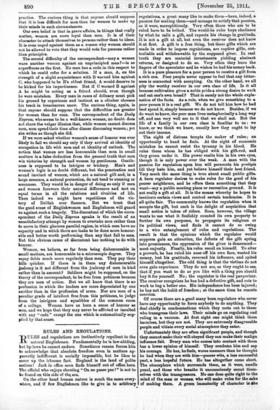WOMEN'S CODE OF HONOUR.
ALADY who wrote a letter to the Daily Express of Monday pleaded with strong feeling and apparent sincerity for the establishment of " a code of honour " for women. She thinks that women have no such code and are frequently at a loss how to act honourably in circumstances in which men would never be in doubt. "It seems to me," she says, "there are two reasons for the present discontent of women, the first being their failure to do anything thoroughly, and the second their general disloyalty." She explains that these assertions are made out of keen sympathy ; she thinks the first defect—the failure to do anything thoroughly— is a defect of education, and that this leads on to the second defect of disloyalty. Disloyalty among women, she says, would cease if they only understood how hideous a thing it is. Men, she goes on, have a code of honour which enables them to discriminate instantly be- tween things honourable and dishonourable ; but women are guided by nothing better than certain elementary proprieties. "What woman," she asks, "has a definite idea upon these two points P Is she justified in cutting an acquaintance about whom she has heard a scandal? May she warn another woman against a man she considers unprincipled ? "
We hardly know whether this appeal betrays more ignor- ance of women or of men, but it is at all events profoundly unjust to women. It would not be worth discussing if it did not happen to represent certain sloppy critical commonplaces which pass for observation. To begin with, the correspond- ent of the Daily Express does not distinguish between a sense of honour and a code of honour. " If women," she argues, " were really capable of understanding what a hideous thing this disloyalty is, they would make a determined effort to cultivate a sense of honour." A. sense of honour and a code of honour are, of course, two different things. A person may seem to act dishonourably through having a sense of honour which runs contrary to easy conventionalities. By the German code of honour an expert swordsman might be called upon to run through a fumbling and untrained antagonist, or an army officer might be required to belabour an unarmed civilian. It is conceivable that his private sense of honour might denounce his public method of sustaining it. Thus the differ- ence between the two things is obvious. Women in our country perhaps think that men have a code of honour which they have only to take out of their pockets and consult, as though it were a notebook, and then act accordingly and be for ever justified in the eyes of the world. How delightfully easy! Man need never make a mistake ! But, of course, all this is the purest breed of nonsense. We should say that men have no code except what arises from their sense of honour brought into being by any particular set of circumstances, and that both their code and sense of honour are no better than the code and sense of honour in women.
What man, any more than a woman, could say offhand whether he would be justified in cutting an acquaintance about whom he bad heard a scandal, or whether he ought to warn one man against another ? Any code which answered such questions—questions most intricate and delicate—with a ready-made formula of action would be an unmitigated curse and a source of unfailing injustice. An educated woman can have as good an understanding as an educated man of the institutions under which she lives, and the common law of England teaches that a person is presumed to he innocent till proved guilty. What better code than this universal code could one have for the guidance of both sexes ? If you are satisfied with the proof that an acquaintance is guilty of that with which gossip charges him, then cutting is justified if cutting seems to you the best way of expressing reprobation. To cut him because he was the subject of mere tittle-tattle would be monstrous. But what code could tell you whether tittle- tattle speaks truly ? Evidently each person must be his own judge of proof. If gossip said that A had cheated B at cards it would be outrageous to assume the statement true, though gossip would be ground for suspicion and for further inquiry. But if B, whom you knew intimately and trusted implicitly, told you that A had cheated him, it would be fair to accept the statement as true. Such proofs must be accepted or ignored on their merits in matters which do not come into the Law Courts for trial, and the acceptance or rejection of them is a matter of everyday experience and
practice. The curious thing is that anyone should suppose that it is less difficult for men than for women to make up their minds iu such circumstances.
Our own belief is that in grave affairs, in things that really matter, women are more loyal than men. It is of their character to attach themselves to persons rather than to ideas. It is even urged against them as a reason why women should not be allowed to vote that they would vote for persons rather than principles.
The second difficulty of the correspondent—may a woman warn another woman against an unprincipled man ?—is as superfluous as the first. No man has a code in this respect to which he could refer for a solution. If a man, A, on the strength of a alight acquaintance with B warned him against 0, who happened to be B's oldest friend, A would deserve to be kicked for his impertinence. But if C warned B against A he might be acting as a friend should, even though he were mistaken. Every man in cases of delicacy must pick his ground by experience and instinct as a climber chooses his track in treacherous snow. The curious thing, again, is that anyone should suppose that the difficulties are greater for woman than for man. The correspondent of the Daily Express, who seems to be a well-known woman, no doubt does not share the vulgar illusion that, while women cannot discuss men, men spend their time after dinner discussing women; yet she writes as though she did.
If we were asked whether women's sense of honour was ever likely to fail we should say only if they arrived at identity of occupation in life with men and at identity of outlook. The notion that women are less honourable than men in small matters is a false deduction from the general truth that men win victories by strength and women by gentleness. Gentle- ness is supposed to be intrigue or trickery. Men's and women's logic is no doubt different, but the penetration and sound instinct of women, which are a natural gift and, in a large measure, a natural protection, do not tend to cunning or meanness. They would be in danger of doing so only if men and women forswore their natural differences and met on equal terms in all the relations and rivalries of life. Then indeed we might have repetitions of the vic- tory of Delilah over Samson. But we trust that the good sense of Englishwomen and Englishmen will guard Rs against such a tragedy. The discontent of which the corre- spondent of the Daily Express speaks is the result of an unsatisfactory attempt by women to overtake men rather than to move in their glorious parallel region, in which men have no capacity and in which there are tasks to be done more honour- able and better worth performing than any that fall to men. But this obvious cause of discontent has nothing to do with honour.
Women, we believe, so far from being dishonourable in small matters, are honourable to a microscopic degree. They repay debts much more regularly than men. They pay their bills quicker. If there is in them any dishonourable jealousy is it not different from the jealousy of men in kind rather than in amount? Soldiers might be supposed, on the theory of the correspondent, to be free from pettiness because they are men of action. But we all know that there is no profession in which the leaders are more depreciated by one another than in the profession of arms. Nor are men of a peculiar grade of intellect free from this pettiness, to judge from the intrigues and squabbles of the common room of a college. Women have as keen a sense of honour as men, and we hope that they may never be afflicted or insulted with any " code " except the one which is automatically sup- plied by that sense.



















































 Previous page
Previous page